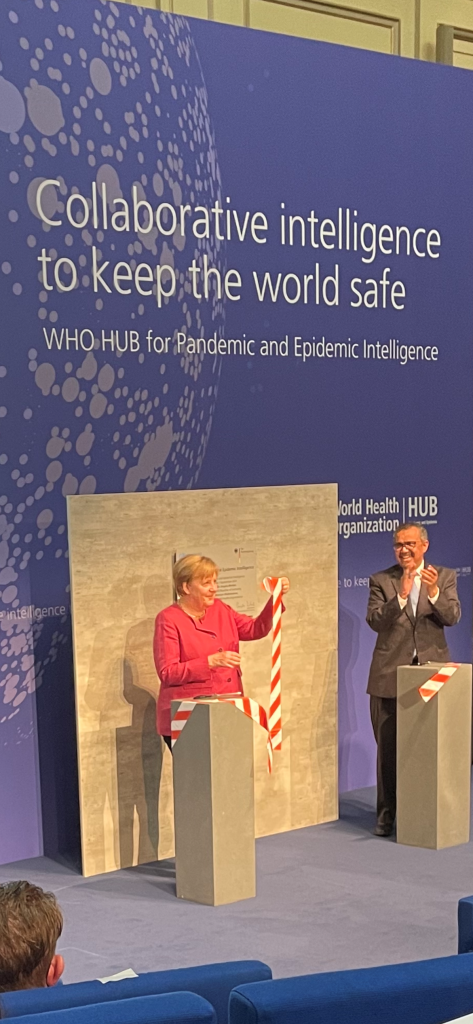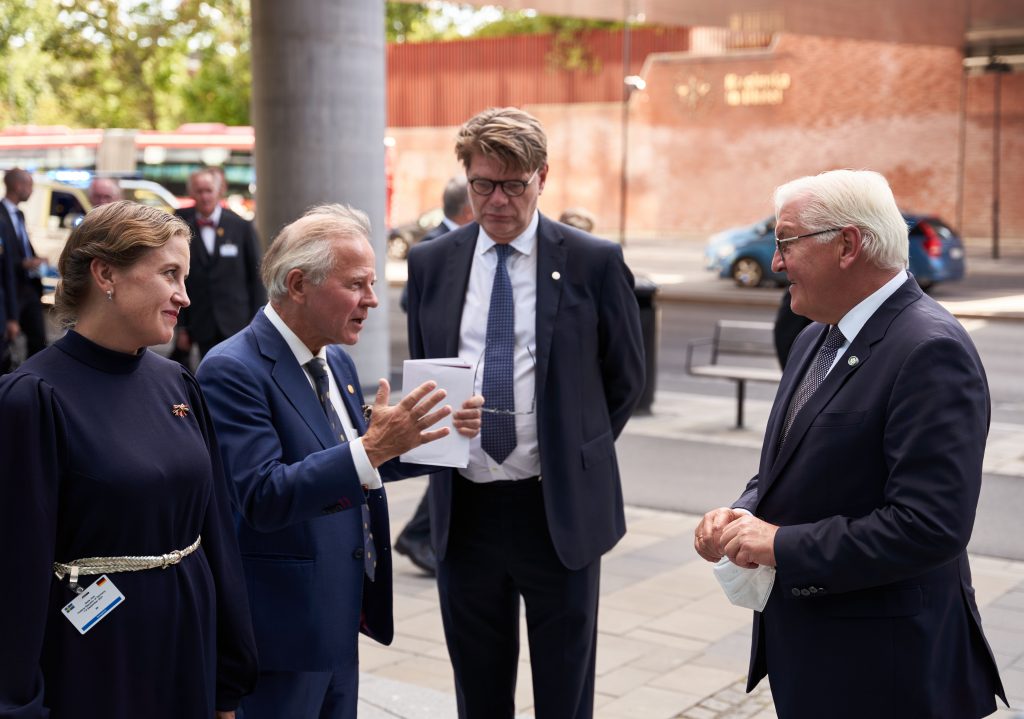“With our high international standing comes great responsibility”
Below the speech that I gave in Bioclinicum (Sune Bergström-aulan) in connection with the state visit by the President of Germany, Frank-Walter Steinmeier, Wednesday 8 September 2021
President Steinmeier, Your Majesty, esteemed guests,
It gives me great pleasure to say a few words about Karolinska Institutet and about the strong and enduring collaboration with Germany in the realms of medical research and education. Mr President, I visited your country and Berlin just a few days ago for the opening of the WHO hub for pandemic and epidemic intelligence. This picture (see below) – that I took on the spot when the ribbon was cut – embodies and symbolizes what the current session is all about: the need to boost international cooperation for better preparedness for health. We don’t know when the next health crisis hits, but we do know that we must be better prepared.
Mr President, this picture (below) is also a tribute to the chancellor, Angela Merkel, and to your country for your unwavering support of global health. Global health, personified in this picture by the Director-General of the World Health Organization, Dr Tedros, is built upon international collaboration and trust between nations, and rests on a solid platform of basic and clinical research. Karolinska Institutet, a medical university, is proud to contribute to this platform. And we do this not only through our international collaboration with Germany and other countries, but through our strong cooperation with the Karolinska University Hospital which hosts us here today. The university and hospital are separated physically just by a narrow street: our main campus is only a stone´s throw away from where we are sitting now. In fact, in symbolic terms the street that separates us narrows as time goes by. I am convinced that Björn Zoëga – the hospital’s CEO – joins me when I say that this is a welcome development.
Precision medicine initiative
An example of what we could call “across the street collaborations” will be presented later in this session: Professor Anna Martling will talk about our joint precision medicine initiative that bridges the gap between research and health care. Precision medicine brings a transformative change to the way we diagnose and treat patients with serious illness and gives hope to many who previously stood without adequate therapies.
A university should be forward-looking – it should be relentless in its search for new diagnostics and new therapies, in its search for better prevention, and in its quest for better preparedness. I mentioned the new hub for pandemic preparedness in Berlin. Last spring, Karolinska Institutet established its own Health Emergency and Pandemic Science center, a virtual center which through research and education aims to build better preparedness before the next crisis hits. Among the esteemed guests here today are Professor Lars I. Eriksson and Doctor Ulrika Widegren who coordinate this new center. My hope is that this center will work synergistically with the new hub in Berlin and further strengthen the close cooperation between our two countries.
Number one medical university
In this most challenging of times, in what I hope is the tail end of an enduring pandemic, and what I fear might be the front end of a serious climate crisis, Karolinska Institutet shoulders a great responsibility. According to one recent university ranking we are now the number one medical university in the European Union. We are also Sweden’s single largest centre of medical academic research and education and we offer the country’s widest range of medical courses and programmes. This gives us a responsibility and an imperative to act on the challenges ahead of us. To do this we need to bolster our collaboration with the hospital and health care sector, with other universities and organizations world-wide, and not least with those low and middle income countries that urgently need to strengthen their capacity for medical care. I am proud to announce that we have coined the term “sustainable health” to the center of excellence that we will launch next week with Makerere University in Uganda. The term “sustainable health” – harking back to the Brundtland Commission – embodies just this: a forward-looking university that strives for better health also for future generations. It is relevant in this regard that a recent UNICEF and Fridays for future report found that 90% of the world’s children are exposed to at least two climate and environmental hazards, and that half of all children live in a country with extremely high climate risk.
Longstanding partnership
In concluding I will say – Mr President – that we are deeply appreciative of our longstanding and productive partnerships with German research and educational institutions, including Charité, the Max-Planck Society, and our Erasmus student exchanges with numerous German universities. Bilateral and global cooperation is a precondition for the rapid advancement and application of scientific knowledge. Especially in times of great turbulence and protectionism, close international relationships strengthen our mutual trust and understanding and help us create shared values that are essential as we strive to find common ground on issues such as academic freedom, ethics, and intellectual property rights.
In closing, I would like to thank you – Mr President – once again for honouring us with your visit today. We look forward to continuing and expanding our collaborations with our German partners – and to cut new ribbons in the realm of medicine and health.




0 comments